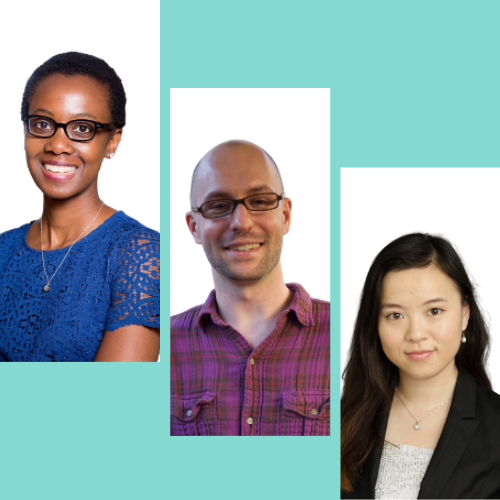
By Kimberley Clementi
Three faculty from UC San Diego’s Department of Computer Science and Engineering (CSE) were among those recognized recently with the National Science Foundation’s Faculty Early Career Development (CAREER) award. Assistant professors Taylor Berg-Kirkpatrick, Ndapa Nakashole and Rose Yu were each honored for exemplifying excellence in their teaching and research.
“NSF CAREER awards hold a special place in our collective hearts, as they help propel our junior faculty into lifelong paths of research and education,” said Sorin Lerner, CSE department chair. “This is a triumph for each faculty winner individually but also for our department and students who will benefit directly from the innovative research and educational opportunities these awards fund.”
Language and Artificial Intelligence
NSF has earmarked funding for Berg-Kirkpatrick’s project on the topic “Modeling Language Evolution via Deep Probabilistic Factorization.” Working with an interdisciplinary team of UC San Diego graduate students, Berg-Kirkpatrick hopes to expand current uses of natural language processing (NLP) systems – such as automatic paraphrasing, optical character recognition and machine translation – to address more robust language diversity.
Berg-Kirkpatrick explained what makes this challenge so daunting. “Like living organisms, languages evolve over time,” he said. “How do words change over centuries? How do writing systems from ancient times morph into the modern writing systems we use today? How do languages split and branch to form new languages?”
While language datasets are vast and complex, Berg-Kirkpatrick contends that there are strong patterns of regularity within them. His project will create a learning paradigm for the study of multi-modal nature language evolution and aims to develop novel artificial intelligence (AI) frameworks that can better understand language diversity in contemporary and historical languages, dialects and writing systems.
Machine Reading in Healthcare
Ndapa Nakashole joined the department in January 2017 to continue her postdoc research on machine reading, information extraction and question answering.
Nakashole’s CAREER-awarded project, “Information Extraction and Integration with Applications to Healthcare Question Answering,” tackles the challenges non-experts experience when researching medical questions on the Web. Given the volume of health information available, these searches can be time-consuming. The information provided is often complex and difficult to comprehend. Even more confounding, inconsistencies can appear between sources – a problem Nakashole traces to vocabulary mismatch, morphological variations, abbreviations and different word orderings.
“To address these challenges, this project brings together health information in a single unified place by assimilating, synthesizing and storing health information in a broad-coverage resource with a shared vocabulary,” said Nakashole.
Nakashole envisions a comprehensive resource that facilitates fast access to medical answers but with the added benefit of improved comprehension as well. Her approach is intended to help all non-experts but especially older adults and those who are not reading in their first language. To this end, her project will generate summaries that combine text and supportive visualizations on an avatar of human anatomy.
Spatiotemporal Data Analysis for Real-time Decisions
CSE Assistant Professor Rose Yu’s research not only focuses on the theoretical underpinning of machine learning but also its broad applications within science and engineering. Yu’s CAREER award project, “New Frontiers in Large-Scale Spatiotemporal Data Analysis,” aims to advance analysis of large-scale spatiotemporal physical science data to facilitate real-time decision-making when it matters most.
“The ultimate goal is to design deep learning (DL) tools that can emulate ocean currents, traffic flows and epidemic spread faster and more accurately than numerical solvers, thus allowing real-time scenario planning, control and strategy optimization,” said Yu.
According to Yu, traditional spatiotemporal analysis tools have been problematic, plagued by inaccuracies and inefficiencies due to their heavy reliance on strong modeling assumptions. These tools are also too slow to operate effectively in real-time scenarios. On top of that, the highly dynamic and intricate interactions of spatiotemporal data create another layer of complexity.
Yu will seek to develop DL techniques that address these central challenges. The NSF award will significantly boost the department’s interdisciplinary research on machine learning for large-scale spatiotemporal data analysis and provide support for CSE graduate and undergraduate students.
“The research plan will also train a new generation of scientists, who can break domain boundaries between machine learning and physical sciences and contribute to the urgent needs of global sustainable development,” said Yu.

